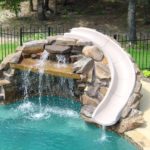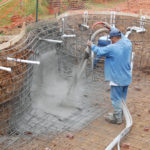How to buy the best pool heater
Why should you buy a pool heater? Because nobody likes swimming in a cold pool. Perhaps you’ve been wanting to extend the pool season so you can swim a earlier in April and keep it open until October…or through November!
Nevertheless, being able to swim in colder weather in a heated pool is something your family and friends will appreciate.
Subsequently, we’ve put together a guide to help you with your process of buying a pool heater.
Firstly, there are 3 major types of pool heaters in the market. Solar Pool Heaters, Gas Pool Heaters, and Pool Heat Pumps. Secondly, the type of heater your need depends on the type of pool you have. Thirdly, the cost of heating a pool will vary. Last but not least, we’ll list the pro and con of a pool heater.
We’ll go over details and cover everything you need to know about heating your pool.
Turn up the heat
Pro tip: BTUs are British Thermal Unit. It’s the measure of heat created by a pool heater. Outputs range from 75,000 BTUs to 450,000 BTUs. The BTU a heater requires to heat up a pool depends on the size of the pool. Larger pools require more BTUs. That’s it; that’s all you need to know about BTUs.
Let’s dive in.
For each type of pool, this guide will go over:
- how a pool heater work
- the cost of having a pool heated
- how to find the right size for your pool
- the pros and cons of each
- how much money you’ll save each year using a heater with a cover
The types of pool heaters
Solar Pool Heaters
This is the most expensive pool heater, but also the most desired type.
Solar pool heaters work by pumping water from your pool to your filter, diverting it through a group of solar collectors that warms the water. And then pumps it back into the pool.
There are two types of solar pool heaters — glazed and unglazed. They each use different materials for solar collectors and vary in durability. Glazed solar collectors tend to be more durable but cost more than unglazed collectors.
Don’t worry about either collectors freezing — both types have freeze protection built into the systems to protect your solar collectors in colder weather places.
How much is a solar pool heater?
A solar pool heater can range in cost from about$3,500 to $8,000 with the average system costing around $5,500 to buy and install.
What is the right size solar heater for my pool?
As a general rule of thumb, to keep your pool heated all year-round, your solar collector should equal to 100% of the size of your pool.
For example, if you have a 16’x32′ inground swimming pool in Simi Valley, you multiply 16′ by 32′ to get the square footage of 512. This means you’ll need 512 square feet of solar collectors.
You’ll need the right size pool pump for a solar heating system is important to make sure your pool is getting enough hot water to heat up.
If you decide to upgrade your current heater to a solar system, you may need a larger pump to help push the water through the solar collectors. The other option would be to install a separate pump for the solar collectors.
Pros of a solar heater
- Eco-friendly and self-powered by your solar collectors.
- 15 to 20 year lifespan.
- Affordable to operate; relatively cheap after the installation costs.
- Great option to heat a pool all year-round.
- Recoup installation costs through energy savings.
Cons of a solar heater
- You need a lot of direct sun light.
- Repayment could take years.
- It takes time to heat the water.
While it could take up a lot of room in your backyard to set up a solar pool heater, with careful planning, it can blend in and complement your landscaping.
Before you get gungho and hire an installer, there are a few things to keep in mind.
Make sure you have enough room on your roof to install the solar collectors, or room the your backyard. Larger pools require more square footage. The distance of your solar collectors from your pool will matter also.
The distance from your solar collectors to your pool will affect the pump and power you need to get the water out and back into your pool.
Simi Valley pool and solar heater installers can help you determine if your home is suitable for a solar option.
Pool Heat Pumps
If solar pool heating system is not possible, then a pool heat pump is a great option. And it lasts longer than gas heaters.
Pool heat pumps cost more than gas pool heaters up front, but they cost less to run because of their efficient heat generating ability.
Here’s how a pool heat pump works in simple steps (a little geeky):
- Water from your pool passes through your pump
- A fan sucks in the outside air and channels it over an evaporator coil
- Liquid refrigerant inside the coil absorbs the heat and turns it into warm gas
- The warm gas goes into a compressor; the heat is increased
- And flows into the condenser where the magic happens — it heats up the cold water from your pool and pumps in warm water
- The whole process cycles through; keeping your pool warm and ready for swimming
Unlike solar pool heaters, heat pumps are rated in horsepower (hp), in addition to BTUs.
Standard sizes include 3.5 hp/75,000 Btu, 5 hp/100,000 Btu, and 6 hp/125,000 Btu.
How much does a pool heat pump heater cost?
Pool heat pump prices start at $2,000 – $3,000 and go as high as $4,000 – $5,000.
Depending on where you live, the cost to run a pool heat pump will vary. If you live in a warmer climate, it will cost less to run.
What is the right size solar heater for my pool?
Pros of a solar heater
- A great alternative to solar heater
- 20-year lifespan
- Affordable to run
- Renewable energy source with no emissions
Cons of a solar heater
- Requires 220V outlet; you’ll have to hire an electrician to outfit one for you
- Doesn’t work as well in cold temperature areas
- Significant upfront cost to install
- Heats the water slowly (but when it’s ready, it’ll be worth the wait)
Gas Pool Heaters
Gas pool heaters, as it’s name indicates, uses natural gas or propane as it’s source of power.
Cold water pass through a burning hot tube and back into your pool.
The fuel you use depend on the availability and price in town.
What is the price of a gas pool heater?
So how much does a pool heater cost?
New inground gas pool heaters can cost between $1500-$3500, depending on the size, type, and brand.
The cost to run a natural gas pool heater is $300-$600 per month and even more for a propane heater.
The high cost of running a gas pool heater can be prohibitive for many homeowners — while the cost of the heat itself is much cheaper than solar heaters or heat pumps, keeping your pool heated all year-round with a gas heater is financially impractical.
What is the right size gas heater for my pool?
There is no secret to finding the right size for any pool heater. You need to know the size of your pool to confirm how much heat you need to warm it up.
Here’s a brief guideline to help you get started:
- What’s the average coldest temperature in Simi Valley. And then figure out the pool temperature you desire. With those two numbers, you can talk to your installer for further guidance.
- Measure the size of your pool (multiple length x width) to find the total surface area you are heating up
- Calculate the BTUs you need to heat your pool. Use the formula: Surface area X Temperate Increase x 12. This will give you the BTUs you will need from your heater to heat your pool
Pros of a solar heater
- Heats the water faster than solar or heat pumps
- Low emission with natural gas
- Cheaper to buy and install
Cons of a solar heater
- Cost double or more to operate compared to solar and heat pumps
- Short lifespan of 5 years on average
- Not eco-friendly
- Propane tank sitting in plain sight. If aesthetics is not your thing, this won’t bother you
One quick note about installing a gas pool heater
The distance from the meter to the installation point matters. The heater won’t fire up if the if the gas line can’t support the heater.
Running a new gas line can cost you $500 to $1,000. So before you get surprised by the additional cost, it’s better you know this before you hire an installer to install your pool gas heater.
Three things to consider so you don’t get blindsided:
- How far is the run from the gas meter to the heater?
- What is the gas line size?
- New install – do you have power at the heater location?
Pro tip: Knowing the correct size of the heater to purchase, distance, and gas size beforehand will save time and trouble.
Gas pool heaters gets your pool heated up quickly – a lot faster than solar or heat pumps. That’s one of the reasons why many pool owners prefer gas pool heaters; if the operating costs doesn’t bother you.
For eco-friendly homeowners, a gas pool heater will rarely be an option, unless you REALLY must heat up your cold pool quickly so you and your family can enjoy it without waiting.
A gas pool heater is the perfect option for homeowners who live in very cold areas.
After spending so much heating up the pool with a gas heater, you should invest in high quality solar covers to retain the heat to cut down on operating costs — otherwise you’ll have to re-heat the pool each time you want to swim.
In Simi Valley, gas pool heaters may not be a your top choice because of the warmer weather, even in the colder months.
Add a Solar Cover and Digital Thermometer for Efficiency
Solar cover is a must if you are investing in a pool heating system.
Keeping your pulse on the pool temperature with a digital thermometer can help you maintain the desired temperature of your pool as well.
Other useful information about heating your pool
What is the best pool heater for your swimming pool?
Choosing the right pool heater depends on what part of the country you live in.
For Simi Valley homeowners, heat pumps or solar heater is the most recommended option — it’s a lot warmer here than it is in New Jersey.
But in general, if you live up north with access to natural gas, then a gas pool heater is your optimal choice.
For homeowners in the north who do not have access to natural gas, a heat pump pool heater should be considered.
Nobody is going to stop you from choosing any of the three pool heater systems — it’s your pool, you get the last word.
How much does it cost to heat a pool
As I mentioned above in all three types of pool heaters, operating costs vary based on the size of your pool, type of heater, source of power, and average temperature rise you want to achieve.
With that said, keeping your pool heated can range from $1,000 to $6,000 or more per year.
How long does it take to heat a pool
This depends on a few things like:
- how many gallons of water is in your pool
- what temperature you want to raise your pool to
- when you plan to go swimming
Calculating your heat run time
Here’s a guide on how you find out how many hours you need to heat your pool to reach your desired temperature.
- One BTU raises one pound of water by 1 degree F.
- One gallon of water weighs 8.34 pounds.
- So, 8.34 BTUs raises one gallon of water by 1 degree F.
First, calculate how many lbs. of water your pool has with this formula.
# of gallons of water X 8.34
Second, calculate the time it takes to increase your pool’s temperature by 1 degree.
pounds of water / BTU Size (this is the heater you have)
Third, multiply the number of hours by the total temperature you want to increase your pool by.
temperature increase * hours
For example, if you have a 21,600 gallon pool, which translates to 16′ x 36′ and a 150,000 BTU heater. You want to raise your temperature from 70 degrees to 80 degrees, for a total of 10 degrees warmer.
Here is how you calculate how long it’ll take to heat your pool.
21,6000 x 8.34 = 180,144 lbs. of water
180,144 / 150,000 = 1.2 hours to heat 1 gallon of water
10 x 1.2 = 12 hours to increase your pool from 70 degrees to 80 degrees
This is a guide and does not represent the exact time it takes to heat your pool. As you can see, there are many variables involved.
Now you can do your own calculations and time your pool time in cold weather flawlessly.
Wrapping it up
Just because the temperatures are getting colder doesn’t mean you have to close your pool for the season. By using a swimming pool heater, you can enjoy your pool and swim comfortably regardless of the temperature outside.
Who’s up for swimming all seasons?





